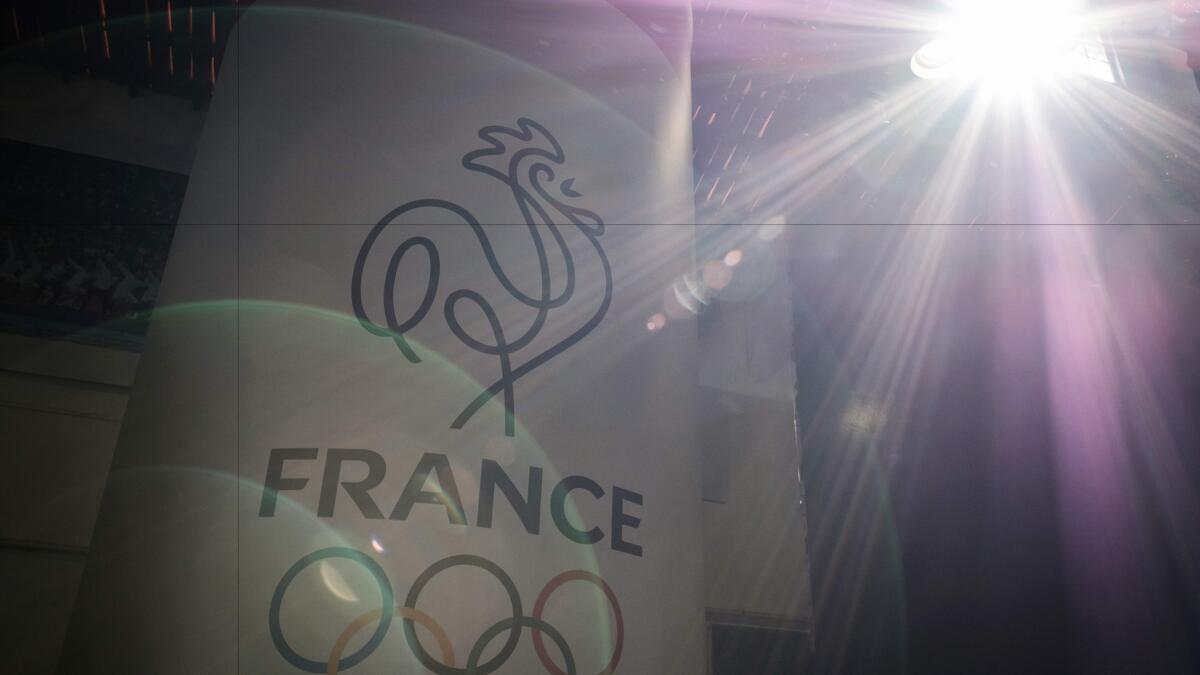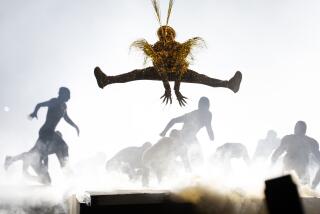Welcome to France House, where Olympians dance, VIPs strut and the liquor flows freely

- Share via
Reporting from rio de janeiro — To the right is a giant room packed with hundreds of dark figures jammed in so tightly they struggle, mostly awkwardly, to dance. To the left is a sterile, brightly lit garden where vendors sell snacks and champagne, huge bathroom lines form, and athletes flash their Olympic credentials, trying to flirt with locals.
In the middle stands Tyrone Smith, a long jumper who competed for Bermuda, and five friends, surveying the odd scene and trying to decide which way to stroll.
“Yeah, I didn’t do so great at Rio 2016,” admits Smith, who grew up in Chicago. “But I’m done now, and it’s nice to come out here and enjoy some of the Olympics post-competition after an intense period of sacrifices.”
And so he’s come here, to one of the thematic national houses set up by many of the countries participating in the Rio Olympics. The buzz among athletes is that the “Club France” here at the Olympic France House is one of the best places to stay out and party. By Rio party standards, tonight isn’t especially wild or fun, but there is enough music and alcohol to energize the mood and offer a relief from the disciplined lives Olympic athletes lead.
“The Olympic Village is so separated from Rio, really,” Smith says.
He says he met plenty of athletes here in Brazil, but realizes after some thinking he hasn’t actually met a single Brazilian. Overhearing that, Adriana Rodrigues steps forward.
Rodrigues is a young curator who has tagged along to this night’s event put on by the “Privelege Brasil” party group because her friend was working there.
“Hi, I’m Adriana,” she says to Smith. “Nice shirt. Is that Yeezy?” she asks, referring the label by musician Kanye West. It’s not.
Rodrigues didn’t pay to get in, and neither did Smith. But until the early hours of the morning, athletes here drink and dance with each other as well as well-connected locals and guests who pay up to $175 to enter.
There’s a total of 1,000 people here. Coincidentally, this is also where U.S. swimmer Ryan Lochte apparently got so smashed he allegedly vandalized a gas station bathroom and then invented a robbery, nearly setting off a national incident.
“That was … interesting,” says Smith diplomatically. But Smith and his friends, coolly surveying the odd party, won’t be getting up to anything like that. “We’re not drinking,” says his friend Damar Forbes who competes for the Jamaican track team. They still had more competitions coming up soon.
After looking around the garden and the dance floor, they steer away from the garden and find themselves a place near the bar to stand and watch the dancing crowd. After they wander away, a woman in the kind of revealing dress often favored by Rio socialites arrives on the same spot, visibly distressed.
“Someone stole my friend’s phone,” says Laura Mello, a stylist. “Just twenty minutes after we got here, her phone disappeared from her purse on the dance floor.”
Another woman bursts over, in tears, and pulls Mello away to talk to one of the many security guards in black suits.
A group of Brazilian women in their early twenties, who were put on the guest list by some Canadian athletes, examine a text on a phone. “Oh my God,” says one. “They say they’ll only come here if I say you guys will hook up with them. We already knew they are losers, now we definitely won’t hang with them again.”
Inside on the dance floor, small groups tend to segregate themselves — Brazilians with Brazilians, Americans with Americans — as they move through the cavernous space. But sometimes they do mix. Behind a group of Russian speakers huddled around a bucket of beers, a slightly inebriated and very friendly Brit grabs an extremely tall man and says, “Hey! Which team are you on?”
“Nigeria basketball,” the man responds, “like it says on my shirt.”
At 2 a.m., the party is still pulsing along, but the beer stand in the garden closes. So bartender Fabiana Dias, 34, curls up underneath the bar and tries to sleep on the beer-soaked green Astroturf outside the view of the revelers.
“I got everything I need in life, but I don’t got money,” says Dias, on the ground. She has to start a new shift here in nine hours, and since it would take almost three hours to get home on public transportation, it’s just not worth it. “I make 100 reais [$30] a day, which isn’t so bad I guess, so I can’t turn down shifts when they become available.”
She volunteers to keep an eye on a charging smartphone for a guest as she pulls her sweatshirt over her knees and rests. As the guest collects it later, around 4 a.m., another worker at the party gives Dias a dirty look, but lets her stay.
As 5 a.m. approaches, groups of athletes slowly make their way to the exit, but hundreds are still inside.
Among them are Colleen Van der Poel and Stephanie Norris, both 21-year-old students at Old Dominion University in Virginia. They are trying to convince two men — one Brazilian, one Dutch — that they are not actually athletes, and the men don’t need to take a picture with them. They finally free themselves and head toward the bathroom line.
“It’s been an interesting party in some ways. We met some athletes, including some medalists,” says Norris. They have a college friend from Rio whose dad works with local sports, and he got them in.
“But,” says Van der Poel, “the vibe here is pretty weird.”
Bevins is a special correspondent.
ALSO
In Rio, poor families are pushed out of their neighborhoods to make way for the Olympics
Armed forces ‘pacified’ Rio’s slums, but as Olympics approached, the gangs came back
Marta and Rafaela: Brazil’s Olympic heroes may be a sign of the nation’s shifting attitudes
More to Read
Sign up for Essential California
The most important California stories and recommendations in your inbox every morning.
You may occasionally receive promotional content from the Los Angeles Times.










